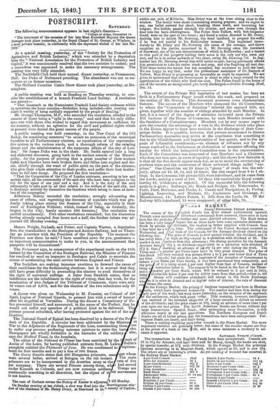The extent of the Private Bill legislation of last session
has been set forth in a Parliamentary Paper issued within the week, and prepared on the motion of Mr. Greene. This document possesses some characteristic features. The names of the Members who composed the 25 Committees, to whom the "Committee of Selection" referred the opposed bills, are given, together with the number of sittings attended by each Member. In fact, it is a record of the degree of attention bestowed upon the Private Bill business of the House of Commons, by each Member invested with the functions of a Committee-man. Members not by any means eager to give the country the advantage of a vote in the divisions which take place in the House, appear to have been resolute in the discharge of their Com- mittee duties. It is possible, however, that persons accustomed to discuss Parliamentary anomalies may arrive at the conclusion that something is due to the blandishments and importunities of law-agents, and to the ap- peals of influential constituents,—an element of influence not by any means confined to the furtherance or obstruction of measures affecting the locality for which the beleagured Committee-man is the representative. Each of the Committees was composed of four Members and a Chairman who does not vote save in cases of equality; and this shows how desirable it is that all the five should appear each day, so as to avoid the overturning of previous votes and the occurrence of those awkward things called " sur- prises." One Committee sat 29 times (a "group" of roads was the sub- ject); others sat 19, 16, 14, and 13 times; the rest ranged from 9 to 1 sit- tings. In the Commons 146 private bills were introduced, and 34 came from the Lords; making a total of 180. Of these 132 received the Royal assent; leaving 48, withdrawn or rejected. Of -the successful bills the following analysis is given: Railways, 35; Roads and Bridges, 12; Waterworks, 9; Ports, Piers, Harbours, and Docks, 5; Canals and Navigations, 2; Paving, Lighting, Improving, and Markets, 15; Enclosures and Drainage, 8; Miscellaneous, 11; Letters Patent, 1; bills from the Lords, 34. Of the Railway bills introduced, 15 were unopposed of peeler hills, 70.


























 Previous page
Previous page